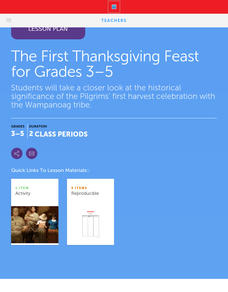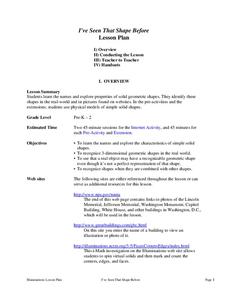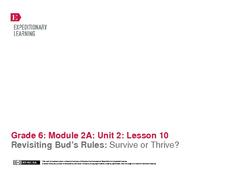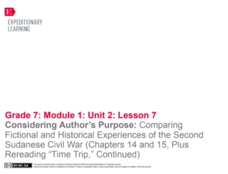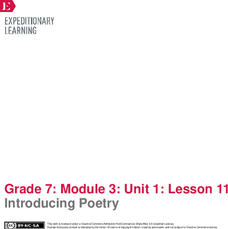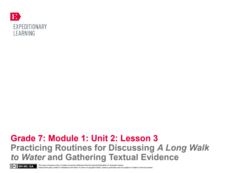EngageNY
Grade 5 Math Module 1, Topic D, Lesson 9
Introduces addition of decimals by using unit notation to represent the problem. Pupils use a place value chart to decompose the numbers and then add before connecting to the standard algorithm.
EngageNY
Grade 5 Math Module 1, Topic B, Lesson 5
There is more than one way to write a number. The lesson plan provides teachers with a way to teach reading and writing decimals to thousandths using standard, expanded, and unit forms. Pupils work through in-class and homework...
Scholastic
The First Thanksgiving Feast for Grades 3-5
Scholars examine the first Thanksgiving through books and interviews while they complete a KWL chart. Pretending they are part of the feast, learners craft a scrapbook page that features images related to their experience. Pupils reflect...
Scholastic
Voyage on the Mayflower for Grades 3-5
Following an online activity, scholars complete a Grafitti Wall in which small groups write words and phrases on chart paper pertaining to Pilgrims, the Mayflower, and Thanksgiving. Pupils perform a close reading then answer a series of...
EngageNY
Scaffolding for Essay: Examining a Model and Introducing the NYS Grade 6–8 Expository Writing Evaluation Rubric
Write it down. Scholars take a close look at essay writing by examining the New York state writing rubric. They then discuss a model essay and compare the model essay to the What Makes a Literary Analysis Essay Effective? Anchor...
Hitchcock Independent School District
Substitute Teacher Guide
So you've signed up to work as a substitute teacher, While you're waiting for that call, download or bookmark a substitute teacher guide that has everything you need to prepare you for any classroom, for any grade, for any subject....
EngageNY
Forming a Research-Based Claim: Cascading Consequences Chart
Can you put that in writing? Scholars work with a partner to write a practice claim before writing their own claims. After writing their claims, learners share with class using a Concentric Circles activity.
Rainforest Alliance
Colombia Biodiversity
How diverse is the rainforest? How much more diverse is a rain forest than a temperate forest? Explore these focus questions in a lesson that explores the plants, animals, and insects in forests. After listening to a reading...
Scholastic
The First Thanksgiving Feast
Following an online activity, scholars listen to a read-aloud of If You Were at the First Thanksgiving by Anne Kamma. Pupils discuss their family traditions and complete a T-chart comparing the holiday then and now. Collages are made to...
EngageNY
Forming a Research-Based Claim: Creating Stakeholders Charts
Present the facts. Scholars create presentations of their research on DDT using their Cascading Consequences chart and a
Stakeholders Impacts chart as visuals. They discuss the term stakeholders and create a Stakeholders Impacts chart...
Education World
The African American Population in US History
How has the African American population changed over the years? Learners use charts, statistical data, and maps to see how populations in African American communities have changed since the 1860s. Activity modifications are included to...
EngageNY
Reading for Gist: “Middle Ages” Excerpt 2
Read and repeat. Scholars repeat the strategies for digging deeper into text from activity two. This time they focus on Middle Ages Excerpt 2. Learners write unfamiliar words in the word catcher and use details from the text to add to...
EngageNY
Reading for Gist and Analyzing Point of View: Moon Shadow
Character analysis isn't always earth-shattering. Using a graphic organizer, pupils analyze Moon Shadow's point of view following the earthquake in Laurence Yep's Dragonwings. Also, scholars co-create an anchor chart showing the...
Fayetteville Public Schools
I've Seen That Shape Before
The objectives in the resource allow students to explore the characteristics of simple solid shapes. Youngsters learn to recognize the face shapes, corners, and edges that make up 3-D figures by filling in a chart. Lastly,...
EngageNY
Reading for Gist: “Middle Ages” Excerpt 1
Dig deep. Scholars dig deep for meaning while reading Middle Ages Excerpt 1. They begin by finding unfamiliar words and adding them to a word catcher. Pupils then take a close look at adversity in the text and complete an...
EngageNY
Presenting a Research-Based Claim: Visual Aid and Peer Critique
Back to the drawing board. Scholars work on the visual to complement their claim presentations using the Criteria for the Cascading Consequences Chart Visual as a guide. They then practice their presentations with partners.
EngageNY
How to Write Like a Scientist in the Field: Introduction to the Elements of Field Journals
It's time to start journaling. Scholars look at examples of science field journals. They work in pairs to examine and complete a note catcher about a field journal. They then add to an anchor chart by discussing the different features...
EngageNY
Analyzing Point of View: Inferring about the Impact of Hurricane Katrina on People Living in New Orlean
What, where, how? Readers hone their analysis skills as they determine the narrator's point of view in Eight Days. They complete a literary analysis chart and essay to describe what and where events take place. Individuals then discuss...
EngageNY
Revisiting Bud’s Rules: Survive or Thrive?
Bud followed a series of rules from Bud, Not Buddy by Christopher Paul Curtis. The question is, how did he use those rules to thrive or survive? After a grand discussion, class members explore the novel to locate and cite textual...
Curated OER
“The Story of an Hour” Extension Activities: Teacher’s Guide and Notes
Enhance and extend instruction of "The Story of an Hour" by Kate Chopin with one or all of these ideas. You might want to cover characterization and summary, or improve understanding of context clues and irony. You can cover any...
EngageNY
Comparing Historical and Fictional Accounts: Second Sudanese Civil War (Chapters 14 and 15, Plus Rereading “Time Trip”)
Let's compare! One pair of scholars adds to the Salva/Nya anchor chart by gathering evidence about the characters from chapters 14 and 15 of A Long Walk to Water. The rest of the class pairs work on adding to the Survival anchor chart....
EngageNY
Introducing Poetry
A silent reading session permits class members to meet individually with their teacher to discuss their text. Learners then discuss and express their observations about two poetry quotes, recording thoughts about craftsmanship, forms of...
EngageNY
Analyzing Evidence: Writing about Theme
Class members prepare for the end-of-unit assessment by analyzing a writing prompt. They complete a Being Made Invisible anchor chart and write their thoughts about captives and invisibility on sticky notes. In addition, they discuss...
EngageNY
Practicing Routines for Discussing A Long Walk to Water and Gathering Textual Evidence
Welcome a new teacher (or two)! While most of the class works on the survival anchor chart, one pair begins the Salva/Nya chart and uses it to teach the class. Each day, scholars switch roles, giving every pair a chance to teach their...


